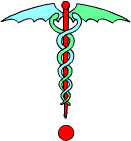How to Get a Doctor's Attention
Created | Updated Nov 20, 2006

My baby daughter nearly died. Very nearly. One night, when she was six weeks old, she went blue, she had convulsions, and became cold, really cold like a piece of marble and went into a coma. I got her to hospital just in time. She stayed that way for six weeks, non-responsive, suffering massive convulsions, several times a day, which sometimes lasted for an hour or more at a time. All we could do was watch. It just felt like I was watching a little blue demon, writhing, eyes rolling, spewing, a scene from The Exorcist. We didn't know what was wrong. Neither did the housemen or the registrars or the senior registrars or the professors and consultants.
Neither did my GP or the midwife or the health visitor. But it didn't have to be this way. I told them. I told them again and again. I don't know how, but as a mother I just knew there was something wrong with the baby. In the first weeks of her life I tried every way I could possibly think of to get my GP and the hospital to understand that I seriously thought the baby had some serious problem. They collectively decided that I was totally potty and that the baby had a milk allergy.
My daughter Mollie very nearly became a 'cot death' baby, because she had a metabolic disease that is treatable. She is now a lovely, pink and un-demonic, well at least most of the time, teenager. I am totally indebted to all of the doctors involved, who diagnosed and saved her and who treat her today. But, I do really do have to say it wasn't necessary for her to come quite so close to death, in order to be admitted. Now I can say, if only I knew, I would have done it all so differently.
So this is the quest, if you are seriously worried about the health of someone in your family How to get the medics to listen!!! Having survived, quite literally, our initial encounters with the medical world, I learned to boost my child's survival chances by becoming an 'expert mother'. This doesn't mean that I bake great apple pies whilst darning socks, it is a real term used by medics in British hospitals to describe mothers who know how to work the system and have become experts within their child's particular field of illness.
In all the hospitals we have been in one of the most common things talked about by patients and their parents is, if only we realised sooner, the GP realised sooner, etc. These are my serious top tips for getting the attention of your doctor if you believe that your child, or any member of your family, is really ill.
Listen to your instincts, they work surprisingly well, use them.
If you think about it, when something is really wrong, you do generally know, even if you won't admit it.
Don't fall into the trap of being convinced everything is okay just because you want it to be. Be realistic, just how worried are you?
Write down a list of all and any symptoms you think might be relevant, in full detail. Record as many details as you can, 'sick at 3.35am, temperature of 39 degrees 3.45am and 3.50am', not 'sick in the night'. Doctors need all the clues they can get. Use all of your senses (appendicitis, for instance, is often diagnosed by the smell), so touch, smell, sounds, put it all down.
Take the written details with you to the doctor/hospital. If you have made notes, they take you more seriously and you won't accidentally miss out any important points.
Don't get angry. Be very, very calm. If you get cross you are labeled neurotic or fussing.
Be persistent. If you are not happy say so, politely. See above.
If doctors use terms you don't understand, ask them to explain it again more clearly. You are not stupid, they are just not explaining properly.The fault is theirs, not yours.
GPs know a lot about things that people get frequently. More unusual conditions can and do slip by them. Be aware of this.
GPs are not trained to diagnose what is wrong with seriously ill people. They are trained to pick out the people who are seriously ill and send them to someone who can find out. So what you are after is actually a referral and not a cure.
You child probably does have flu, but if you are really convinced for any weird reason (see instincts above) that it isn't, say so emphatically.
Ambulances. You are allowed to call them. If you are really really worried about someone's immediate condition, something is happening to them that frightens you to your soul, call an ambulance.

